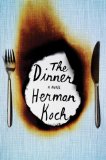Summary | Excerpt | Reading Guide | Reviews | Beyond the Book | Read-Alikes | Genres & Themes | Author Bio

This article relates to The Dinner
Early on in The Dinner, we discover the reason Paul and Claire are meeting Serge and Babette for dinner: they are to discuss a problem facing their children, Michel and Rick. We know the boys have done something wrong. Then Paul mentions a genetic test that could—through amniocentesis—identify a mysterious and unnamed condition that might predict an individual's tendency toward violence. It made me wonder if such a test really exists. And, if so, what would a parent do with that information?
The birth of a child is usually a moment of great joy. The parents are filled with anticipation for the future, with hopes and dreams. Great expectations abound. But, if a parent knew his infant—a perfect, sweet-smelling bundle of joy—would grow up to perform horrific acts of violence, would he love that little baby any less? Would she want to do whatever possible to change that dismal destiny? And could that parent be held accountable for the child's crime?
If a food allergy is identified, of course parents will ensure that food is avoided. If skin cancer runs in a family, the diligent use of sunscreen is to be expected. Children of alcoholics are encouraged to be wary of the risk of addiction. What if violence and aggression could be predicted?
An estimated 1/3 of the male population carries a genetic mutation of the MAO-A (Monoamine oxidase A) gene. This gene is believed to be crucial in handling the body's response to anger. When this MAO-A polymorphism occurs, an individual may exhibit excessive aggression; as noted by Dutch geneticist Dr. Han Brunner. Nicknamed the "Warrior Gene," this mutation has been suggested as a sort of marker to predict acts of violence. However, the aggressive behaviors are most likely to occur when the individual has also been exposed to violence or mistreated as a child.
It is, perhaps, tempting to blame a particular biological condition when trying to make sense of the incomprehensible. Connecticut's chief medical examiner has asked geneticists to examine the DNA of Adam Lanza, the young gunman who shot 26 people at an elementary school in Newtown, Connecticut in December 2012 for possible genetic anomalies. But would a single gene variance truly explain this horror? More important, will this knowledge help us to prevent a future attack?
In the documentary, "Born to Rage: Inside the Warrior Gene," two brothers, both former gang members, were found to carry this particular genetic marker. However, they also reported growing up in the midst of gang life and were active members by the age of ten. Since then, each man has denounced gang life and both contribute positively to society. Other men with a history of violent crime were also identified with carrying this mutated gene, as were several Buddhist monks dedicated to a life of peace and a former Navy Seal turned entrepreneur. And yet, none of the professional Mixed Martial Arts fighters tested positive. In short, the connection between the "warrior gene" and violence seems to be tenuous at best.
As Dr. Han Brunner said, "because genes are essentially simple and behavior is by definition complex, a direct causal relationship between a single gene and a specific behavior is highly unlikely."
To see the documentary about the warrior gene, click on the video below:
Filed under Medicine, Science and Tech
![]() This "beyond the book article" relates to The Dinner. It originally ran in February 2013 and has been updated for the
October 2013 paperback edition.
Go to magazine.
This "beyond the book article" relates to The Dinner. It originally ran in February 2013 and has been updated for the
October 2013 paperback edition.
Go to magazine.
Show me the books he loves and I shall know the man...
Click Here to find out who said this, as well as discovering other famous literary quotes!
Your guide toexceptional books
BookBrowse seeks out and recommends the best in contemporary fiction and nonfiction—books that not only engage and entertain but also deepen our understanding of ourselves and the world around us.